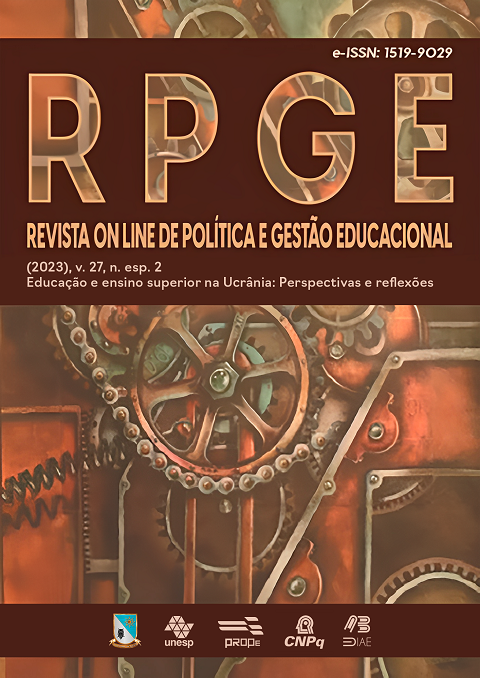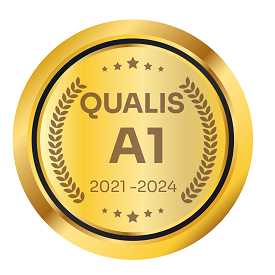La educación ucraniana hoy
Procesos de globalización y transformación
DOI:
https://doi.org/10.22633/rpge.v27iesp.2.18586Palabras clave:
Ucrania, Educación, Transformación, Globalización, ExtranjerosResumen
El actual avance de las tecnologías educativas señala la necesidad de reformar el sistema de formación de recursos humanos en Ucrania. Este artículo tiene como objetivo analizar el estado actual de la educación en Ucrania a la luz de los fenómenos de la globalización y las transformaciones contemporáneas. Este estudio se centra en la evaluación del interés de los estudiantes extranjeros en el sistema educativo ucraniano. La metodología adoptada se basa en el análisis, síntesis y generalización de la información. Los resultados identifican las principales direcciones del desarrollo de la educación en Ucrania en el contexto de la globalización, destacan las áreas clave de competencia digital y proporcionan una caracterización completa de los aspectos positivos y negativos del impacto de la globalización en la educación contemporánea en Ucrania. Las conclusiones enfatizan que el objetivo primordial de estas transformaciones es establecer las bases para enfoques educativos centrados en el individuo, promover la autorrealización creativa y garantizar la igualdad de oportunidades en la obtención de servicios educativos de calidad.
Descargas
Citas
ANGGRAINI, R.; HANDAYANI, Y. Digitalization in education. Journal of Digital Education, Communication, and Arts (Deca), v. 5, n. 01, p. 1-12, 2022. DOI: 10.30871/deca.v5i01.2942.
ARMOUR, K.; GOODYEAR, V.; SANDFORD, R. The digital age challenge. In: ARMOUR, K. M.; GOODYEAR, V. A.; SANDFORD, R. School Physical Education and Teacher Education. [S. l.]: Routledge, 2020. p. 92-102. DOI: 10.4324/9780429330186-9.
BABYCH, V. et al. Improvement of teaching methods of the theoretical component of physical education (with the application of author teaching techniques) in the context of improving the level of social health of students of the special medical group. Journal for Educators, Teachers, and Trainers, v. 13, n. 5, p. 1-9, 2022. DOI: 10.47750/jett.2022.13.05.001.
BADER, S.; OLEKSIIENKO, A.; MERENIUK, K. Digitalization of future education: analysis of risks on the way and selection of mechanisms to overcome barriers (Ukrainian experience). Futurity Education, v. 2, n. 2, p. 21–33, 2022. DOI: DOI: 10.57125/FED/2022.10.11.26.
BOICHENKO M. et al. Creative activity at higher education institutions: Ukrainian pedagogical overview. Amazonia Investiga, v. 11, n. 59, p. 161–171, 2022. DOI: 10.34069/AI/2022.59.11.15.
BRUNER, R.; IANNARELLI, J. Globalization of Management Education. Journal of Teaching in International Business, v. 22, n. 4, p. 232-242, 2011. DOI: 10.1080/08975930.2011.653908.
BUKLIV, R.; KUCHAK, A.; VASYLYUK-ZAITSEVA, S. Professional training of future academic staff and digitalization of education: analysis of mutual influences. Futurity Education, v. 3, n. 1, p. 69–78, 2023. DOI: 10.57125/FED.2023.25.03.06.
BYGSTAD, B. et al. From dual digitalization to digital learning space: Exploring the digital transformation of higher education. Computers&Education, v.182, p. 104463, 2022. DOI: 10.1016/j.compedu.2022.104463.
CHODUBSKI, A. Globalization — Politics — Education. Polish Political Science Yearbook, v. 42, n. 1, p. 7-20, 2013. DOI: 10.15804/ppsy2013001.
CZYŻ, A. K. Attitudes of polish schools’ teachers towards the idea of inclusive education for disabled people. People: International Journal of Social Sciences, v. 4, n. 1, p. 542-554, 2018. DOI: 10.20319/pijss.2018.41.542554.
DHAWAN, S. Online learning: A panacea in the time of COVID-19 crisis. Journal of Educational Technology Systems, v. 49, n. 1, p. 5-22, 2020. DOI:10.1177/0047239520934018.
GOODLEY, D. et al. Rebooting Inclusive Education? New Technologies and Disabled People. Canadian Journal of Disability Studies, v. 9, n. 5, p. 515-549, 2020. DOI: 10.15353/cjds.v9i5.707.
HUANG, R.; SPECTOR, M.; YANG, J.Educational technology: a primer for the 21st century. [S. l.]: Springer, 2019. 248 p. ISBN 9789811366420.
JENA, B.; GUPTA, S.; MISHRA, N. Effectiveness of online learning and face-to-face teaching pedagogy. In: JENA, B. M.; GUPTA, S. L.; MISHRA, N. Transforming higher education through digitalization. Boca Raton: CRC Press, 2021. p. 21-43. DOI:10.1201/9781003132097-2.
KHAN, H. I. Globalization and Education. Journal of Education and Educational Development, v. 1, n. 1, p. 67–70, 2014. DOI: 10.22555/joeed.v1i1.4.
KHARITONENKO, L. Innovations and traditions in Ukrainian language teaching at the educational establishments of Ukraine: cases, models of the future. Futurity Education, v. 2, n. 1, p. 57-71, 2022. DOI: 10.57125/FED.2022.25.03.7.
KORNEIKO, Y.; TARANGUL, L.; DOVZHUK, V. Traditions and innovations: two poles of education of the future. Futurity Education, v. 3, n. 1, p. 5–14, 2023. DOI: 10.57125/FED.2023.25.03.01.
LÓPEZ, O. The Digital Learning Classroom: Improving English Language Learners’ academic success in mathematics and reading using interactive whiteboard technology. Computers & Education, v. 54, n. 4, p. 901-915, 2010. DOI: 10.1016/j.compedu.2009.09.019.
MISHRA, M. S. Teacher Education- Globalization Framework. IOSR Journal of Research & Method in Education, v. 4, n. 1, p. 19-20, 2012. DOI: 10.9790/7388-04111920.
NEUBAUER, D. Globalization, interdependence and education. Frontiers of Education in China, v. 2, n. 3, p. 309–324, 2007. DOI: 10.1007/s11516-007-0026-7.
OLIVEIRA, A. et al. Emerging technologies as pedagogical tools for teaching and learning science: a literature review. Human Behavior and Emerging Technologies, v. 1, n. 2, p. 149-160, 2019. DOI:10.1002/hbe2.141.
RAK-MŁYNARSKA, E. Analysis of trends in the development of the educational environment: education of the future. Futurity Education, v. 2, n. 2, p. 4–13, 2022. DOI: 10.57125/FED/2022.10.11.24.
RANI, G.; KAUR, P.; SHARMA, T. Digital education challenges and opportunities. Journal of Engineering Education Transformations, v. 35, n. 4, p. 121-128, 2022. DOI:10.16920/jeet/2022/v35i4/22111.
SAFONOV, Y.; USYK, V; BAZHENKOV, I. Digital transformations of education policy. Baltic Journal of Economic Studies, v. 8, n. 2, p. 127-136, 2022. DOI: 10.30525/2256-0742/2022-8-2-127-136.
SAMUEL, V. Globalization and Theological Education. Transformation: An International Journal of Holistic Mission Studies, v. 18, n. 2, p. 68–74, 2001. DOI: 10.1177/026537880101800202.
SHERMAN, M.; SAMCHYNSKA, Y. Information and reference system of rare and endangered species of animals as a means of forming the digital competence of future ecologists. Information technologies and teaching aids, v. 72, n. 4, p.121-135, 2019. DOI: 10.33407/itlt.v72i4.2479.
SPRING, J. Globalization of Education. International Journal of Chinese Education, v. 1, n. 2, p. 139–176, 2012. DOI: 10.1163/22125868-12340002.
STOIKA, O. The digital transformation of higher education in Hungary. Continuing Professional Education: Theory and Practice, v. 3, p. 90–95, 2022. DOI: 10.28925/1609-8595.2022.3.12.
WILLIAMSON, B. New digital laboratories of experimental knowledge production: artificial intelligence and education research. London Review of Education, v. 18, n. 2, 2020. DOI:10.14324/lre.18.2.05.
ZINCHENKO V.; OSTAPENKO S.; UDOVICHENKO H., Introduction of academic honesty as a necessary prerequisite and an important component of quality education for future economists. Revista Românească pentru Educaţie Multidimensională, v. 13, p. 81‒95, 2021. Disponível em: https://lumenpublishing.com/journals/index.php/rrem/article/view/2974/2773. Acesso em: 10 jan. 2023.
МЕДИЧНА ОСВІТА. Statistics on Studying Foreign Students in Ukraine. [S. l.], 2020. Disponível em: http://medosvita.info/2020/08/31/%D1%81%D1%82%D0%B0%D1%82%D0%B8%D1%81%D1%82%D0%B8%D0%BA%D0%B0-%D1%89%D0%BE%D0%B4%D0%BE-%D0%BD%D0%B0%D0%B2%D1%87%D0%B0%D0%BD%D0%BD%D1%8F-%D1%96%D0%BD%D0%BE%D0%B7%D0%B5%D0%BC%D0%BD%D0%B8%D1%85-%D1%81/. Acesso em: 10 jan. 2023.
Descargas
Publicado
Cómo citar
Número
Sección
Licencia
Derechos de autor 2023 Revista on line de Política e Gestão Educacional

Esta obra está bajo una licencia internacional Creative Commons Atribución-NoComercial-CompartirIgual 4.0.
Manuscritos aceitos e publicados são de propriedade da Revista on line de Política e Gestão Educacional. É vedada a submissão integral ou parcial do manuscrito a qualquer outro periódico. A responsabilidade do conteúdo dos artigos é exclusiva dos autores. É vedada a tradução para outro idioma sem a autorização escrita do Editor ouvida a Comissão Editorial Científica.











